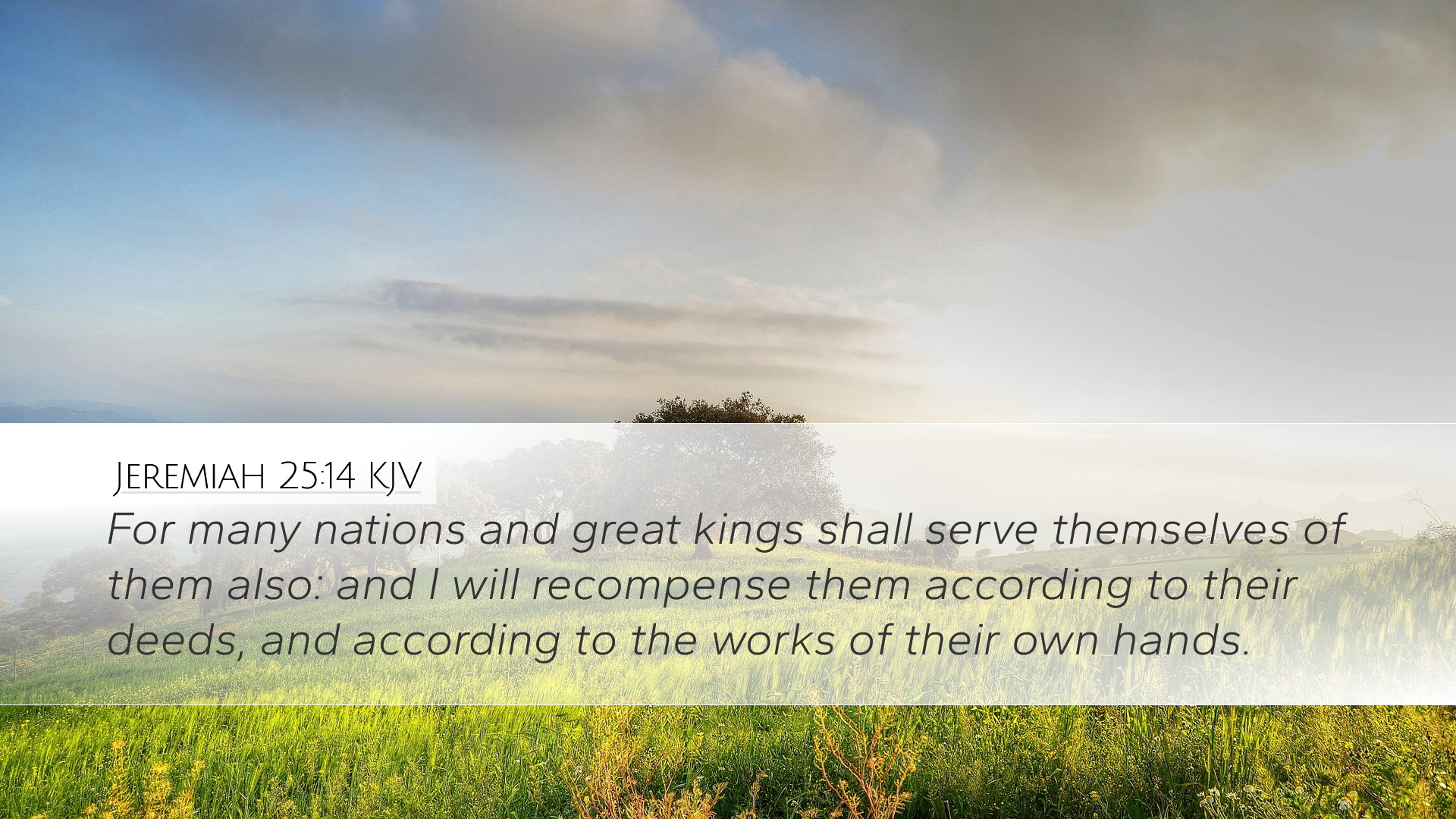Commentary on Jeremiah 25:14
Jeremiah 25:14 reads: "For many nations and great kings shall serve themselves of them also; and I will recompense them according to their deeds, and according to the works of their own hands."
Introduction
This verse appears in a critical section of the Book of Jeremiah, where the prophet foretells the impending judgment upon Judah and the surrounding nations. Jeremiah, known as the weeping prophet, conveyed God's messages of warning, urging repentance among His people while relaying God's promises of judgment upon the nations that would oppress Israel.
Contextual Analysis
The context surrounding Jeremiah 25:14 is pivotal to understanding its implications. This chapter presents God’s impending judgment against Judah and various nations, including Babylon, which would serve as God's instrument for the discipline of His people. In this verse, God outlines the future of these nations—how they too would face consequences for their actions.
- Historical Context: During Jeremiah's time, Judah was plagued by idolatry, injustice, and spiritual apathy, leading to divine judgment. Jeremiah's prophesies often intersected with contemporary Babylonian dominance.
- Literary Context: The surrounding verses speak of the impending exile of the Israelites and God’s orchestration of events in history. The inclusion of nations and kings emphasizes the global reach of God's sovereignty.
Insights from Matthew Henry
Matthew Henry emphasizes the certainty of God's judgment, noting that nations acting against God's people are not free from accountability. He comments on the assurance that even great kings, despite their power, will be held accountable for their deeds. In Henry's view, this serves as a profound warning not only to Israel but to all nations about the moral implications of their governance:
- Divine Sovereignty: He stresses that God's governance extends beyond Israel, affecting all nations, as they are subject to His rule.
- Accountability of Nations: Henry suggests that nations may flourish for a time but will ultimately face divine recompense based on their actions.
This reinforces the theological principle that God observes the conduct of all nations and their leaders, affirming that divine justice is inevitable.
Insights from Albert Barnes
Albert Barnes provides a detailed examination of the term "serve themselves of them", interpreting this phrase as a recognition of the nations that will utilize God's people for their benefit, particularly emphasizing their exploitation:
- God's Instrument of Justice: He illustrates how God uses nations like Babylon as instruments for His purposes—retribution against Israel while ensuring that these nations are not exempt from judgment.
- Nature of Recompense: Barnes notes that God's recompense is based distinctly on “their deeds,” asserting that the principle of divine justice applies universally.
This leads to a theological understanding that God's plans encompass all nations, reminding readers that His judgment is impartial and grounded in justice.
Insights from Adam Clarke
Adam Clarke provides a rich interpretive insight, particularly focusing on the phrase "great kings". In Clarke's analysis, he recognizes the significance of leadership and the roles these leaders play, not just in their own nations but also in global history:
- Leadership Responsibility: Clarke emphasizes that rulers are responsible for the moral direction of their nations and will face consequences for their actions against God's people and values.
- Interconnectedness of Nations: He underscores the idea that no nation operates independently of divine oversight, especially when they act against the covenant community of God.
Clarke’s commentary exemplifies the interconnected nature of nations under God's sovereign will, reiterating that God's ultimate goal transcends national borders.
Theological Themes
- God’s Sovereignty: At the forefront of this verse is a profound recognition of God’s sovereignty over all nations. He is the ultimate judge who evaluates the actions of every nation and king.
- Justice and Judgment: The text affirms the reality of divine justice—no action, whether by a king or a common citizen, evades God's scrutiny.
- Hope for Restoration: Despite the judgment foretold, within the broader narrative of Jeremiah lies the hope of restoration for those who turn back to God. This remains a central theme for Judah during this tumultuous period.
Application for Today
In contemporary application, Jeremiah 25:14 serves as a reminder for nations today regarding the moral responsibilities of governance. Pastors, students, and theologians may find the following applications particularly relevant:
- Call for Integrity: Leaders and nations are encouraged to act with integrity, justice, and righteousness, knowing that their actions have ramifications not only for themselves but for their nations and for God's people.
- Awareness of Global Accountability: This verse invites a global consciousness among believers that extends beyond their immediate context into the broader implications of how nations affect one another.
- Encouragement for the Oppressed: The oppressed may find solace in the knowledge that God sees their plight and will ultimately execute justice, supporting the faint-hearted and providing hope.
Conclusion
Jeremiah 25:14 stands as a powerful reminder of God's unyielding sovereignty and justice over all nations. As believers reflect on this verse, they are urged to recognize the implications of their actions, the responsibilities of their leaders, and the overarching narrative of God's redemptive plan that transcend generations.


